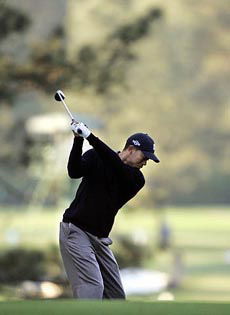Why we don't need a backswing...
Cutting your golf swing in half could be the next big technological advance

 BORDER='1' STYLE='margin-left:10' VSPACE='5' ALT='We don't need a backswing'> |
Forget about square-headed drivers, putters with grooves in the face and irons with moveable weights. Cutting your golf swing in half could be the next big technological advance.
Among over 100 club professionals, gadget makers, engineers and scientists at a conference at the Massachusetts Institute of Technology this week was golf coach TJ Tomasi, from Nantucket, who claimed that golfers would improve if they started with the club poised at the top of the swing, instead of taking it there from the address position.
"Since no research exists to the contrary, it's possible the typical backswing is not needed to hit good golf shots," Tomasi said, describing the experiment that he and fellow golf pro Jim Suttie recently conducted at Twin Eagles Golf Club in Florida.
Tomasi, who also holds a doctorate in education, said that holding the club in the correct position at the top of the swing, (like a baseball batter or a cricketer waiting for the ball to be delivered), avoids the 'kinesthetic clutter' of the backswing.
In his study, 29 golfers took 10 radar-tracked swings - half with a backswing and half without. Tomasi reported that except among professional golfers, there was no statistically significant difference in the accuracy or distance of the shots.
He claimed that if instructors taught the "no backswing" technique, accuracy would improve, though it would take much more to persuade golfers to ignore deeply-rooted tradition.
Some golfers may remember how Sandy Lyle and Gordon J Brand went through phases of pausing at the top of the backswing with some success, while PGA Tour pro Ryan Moore finished second in the 2006 Buick Championship, despite injury to a hand which meant he couldn't take the clubhead back and had to start every shot by setting the club at the top of the backswing.
"Golf has become the most scientific sport in the world," said Ben Shear , director of strength and conditioning at the Golfer's Edge training facility in New Jersey. "This is not about just golf; it's about the laws of the universe, and you can't deny them, if you want to be good at the sport."
New motion-sensing technologies appear to be the next revolution, giving athletes and scientists the chance to understand the physics and biomechanics behind feats of strength and speed. It also gives them a way to quantify the results of time-honoured practices.
"There are teaching methods we've used for years and now we have the tools to see if they really work really well," said Kim Blair , director of the MIT Centre for Sports Innovation.
A study to be presented today found that among a sample of 85 golfers, only 15 per-cent could accurately aim at a hole from six feet away.
Ah, putting! Now that's another story...

